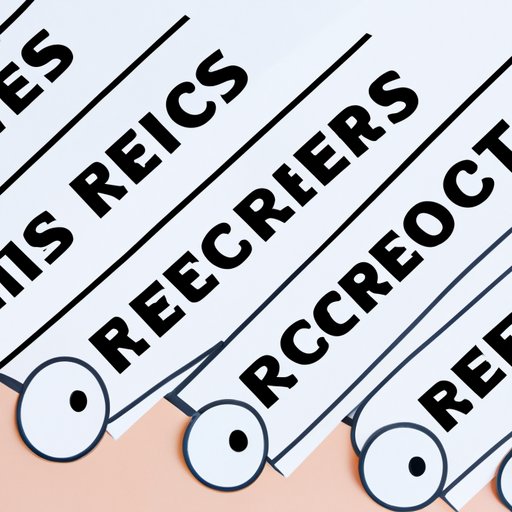
I. Introduction
As a business owner, it’s essential to keep thorough and accurate records of all transactions to ensure legal compliance and financial success. However, determining how long to keep business records can be a daunting task for many entrepreneurs. This article will provide a comprehensive guide to understanding the legal requirements, benefits, and best practices for keeping business records.
II. The Legal Requirements
Businesses are required by law to keep accurate and complete records of their financial transactions and activities. This includes financial statements, tax returns, employment records, and other important documents. Failure to comply with these legal requirements can result in severe consequences, such as hefty fines, legal penalties, or even imprisonment.
The length of time required to retain records varies by document type and jurisdiction, making it essential to stay up to date with the applicable laws. For example, in the United States, tax returns should be kept for at least three years, while other documents such as employee records should be kept for up to seven years. In contrast, businesses operating in the European Union need to comply with the General Data Protection Regulation (GDPR) where records retention periods can go as far as ten years.
It’s worth noting that legal requirements can differ depending on the industry your business operates in, and it’s also wise to consult with an accountant or lawyer for specific requirements.
III. The Benefits of Keeping Records
Keeping thorough and accurate records of business transactions and activities goes beyond legal compliance. It can also help businesses in various ways, such as:
- Facilitating strategic planning and decision-making.
- Improving financial management and budgeting.
- Ensuring efficient and effective tax preparation.
- Providing valuable insights into customer behavior and preferences.
- Assisting with potential legal disputes or litigation.
Not only do good records help to enhance your business performance, but they can also help maintain your financial data integrity and improve accountability. By having a clear and detailed financial history, your business will better position itself for growth and success.
IV. Types of Business Records
There are various types of business records that should be kept to ensure accurate record-keeping, such as:
- Financial Records – Such as income statements, balance sheets, bank statements, invoices, and receipts.
- Human Resources Records – Including employment contracts, payroll records, performance reviews, and disciplinary actions.
- Legal Records – Such as incorporation, contracts, licenses, and permits.
- Insurance Records – Such as property and liability insurance policies.
- Marketing and Sales Records – Including customer lists, sales reports, and advertising costs.
Each type of record is important and serves a specific purpose in your business operations and financial management. When it comes to record keeping, the more detailed and accurate the records, the better.
V. Archiving Methods
It’s essential to properly store and archive business records accordingly, both physical and digital. Common mistakes such as misplacing records or having inadequate organization can cause significant stress and setbacks down the line. To keep business records organized and easily accessible, keep these archiving methods in mind:
- Physical Records – Store in a secure, fire-resistant, and climate-controlled environment.
- Digital Records – Utilize secure and reliable cloud-based storage solutions. Ensure data backup and disaster recovery measures are in place.
- Organize records – Keep records in chronological order and categorize documents, so records are easily searchable and retrievable.
VI. Exceptions to the Rule
Some business records require specific retention periods and may have exemptions from general rules. Employee records and legal matter documents, such as lawsuits, are prime examples. Companies must maintain sensitive employee records, including compensation, benefits, reviews, and employment contracts, for several years after the separation of their employment. These records can help protect the business against potential legal disputes and help settle compensation disputes.
Industries such as healthcare or financial institutions have specific retention requirements governed by several compliance regimes. Consulting with an attorney or regulatory experts in this regard would provide further insight into the criteria for recordkeeping retention exceptions.
VII. Electronic Records
In recent years, businesses are moving towards electronic records due to the many benefits it provides, such as better organization, cost savings from physical storage, and easier record accessibility. There are challenges, too. Businesses must take into account issues like data breaches, software bugs, and the importance of backing up cloud data. When it comes to retaining electronic records, companies must develop and implement clear policies, apply security measures like access controls and encryption, and use regular data backups to safeguard against data loss. Electronic and digital records, primarily personal data, are subject to regulatory schemes, such as GDPR and HIPAA.
VIII. The Importance of Record Disposal
While having good records and accurate retention is essential, it’s just as necessary to dispose of the records properly when they’re no longer needed. This helps protect confidential information and prevent data breaches and identity theft. It’s helpful to consider using a trust professional disposal service for proper and secure disposal of hard drives, paper documents, and other records that contain personal or financial information. Laws and regulations, including state and federal laws, exist that regulate disposal and destruction of certain records, including personal information.
IX. Conclusion
Keeping accurate and detailed business records is essential for legal compliance and financial success, along with improving strategic planning, financial management, and decision-making. There are different types of business records, and each has its retention period, which varies from industry to industry. While electronic records are gaining popularity, ensure to have policies for retention and destroying old records safely. Lastly, keep proper documentation of record disposal to protect customers’ personal information from data breaches and identity theft. By following these best practices, businesses can better protect themselves, their customers, and achieve sustainable success.





